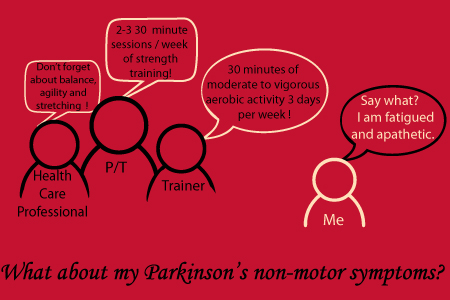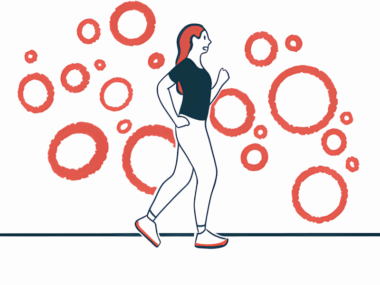Exercise Rx: What About Apathy and Fatigue?
Written by |

Recently, the Parkinson’s Foundation partnered with the American College of Sports Medicine to provide new exercise recommendations for people with Parkinson’s and certified exercise professionals. The goals of this collaboration are admirable and long overdue. They seek to:
- Ensure standards of care for exercise professionals working with people who have Parkinson’s
- Ensure exercises are safe and effective at improving the quality of life for people with Parkinson’s
- Develop competencies for exercise professionals who work with people who have Parkinson’s
As someone who lived an exercise lifestyle before my Parkinson’s diagnosis, I agree that the exercise guidelines documented as an outcome of this partnership will help improve the quality of life for people with Parkinson’s. The detailed intensities, duration, and frequencies across the four domains of exercise — aerobic, strength, flexibility, and balance — specific to people with Parkinson’s are well-defined.
However, I feel there may be elephants in the room that should be acknowledged.

(Graphic by Jean Mellano)
My background
I am sharing this information because I feel it is important for the reader to understand that I am no stranger to daily exercise.
In 2015, I was diagnosed with Parkinson’s at age 62. For most of my adult life, I have lived an exercise lifestyle.
In the years leading up to my diagnosis, I had a fairly aggressive exercise schedule. I danced up to three hours per week, cycled up to 80 miles per week, race walked up to 12 miles per week, weight trained three times per week, and taught several weekly spinning classes.
Now, mainly due to my Parkinson’s symptoms of extreme fatigue and apathy, I can’t adhere to the exercise guidelines as described by this partnership. If I couldn’t go on autopilot to get my butt out the door to exercise (a skill I developed through years of training), I would find it impossible to exercise.
My quality of life is deteriorating, especially since I can’t exercise with intensity anymore. Plus, in addition to feeling terrible, I am exhausted after I work out.
Exercise becomes even more daunting when a person with Parkinson’s has never previously exercised regularly.
What are the elephants?
“Apathy can be a major non-motor symptom of Parkinson’s disease. Combine it with fatigue, another major non-motor symptom, and it’s no wonder we Parkies can be seen as lazy, disinterested or uncaring by friends, family and even strangers.” — Bev Ribaudo
Apathy and fatigue can discourage a person with Parkinson’s from starting an exercise program. Apathy is defined as a lack of interest or motivation. It interferes with the effective management of Parkinson’s symptoms since apathetic people are less inclined to do things like exercise.
Parkinson’s-related fatigue can make someone feel like it is impossible to move, as if they had no energy at all. Ironically, exercise is recommended for alleviating fatigue and apathy. What a conundrum!
Another overlooked elephant
“Walking a mile in someone else’s shoes isn’t as much about the walk or the shoes; it’s to be able to think like they think, feel what they feel, and understand why they are who and where they are. Every step is about empathy.” — Toni Sorenson
Unless a person has Parkinson’s, there is no way they can comprehend how we feel. I once prided myself on my discipline and commitment to exercise. Now that I have Parkinson’s, I am overwhelmed with all the time I must put in to fight this disease. When the following are added to an intense exercise program as described in the exercise guidelines, battling Parkinson’s becomes an all-consuming, full-time job:
- Psychotherapy sessions
- Support group attendance
- Speech and swallow therapy
- Occupational therapy
- Smell training
- Handwriting practice
What still needs to be addressed?
For this undertaking to be successful, I believe the potential barriers that lead to inactivity must be addressed. In the published exercise guidelines, I did not see any acknowledgment of the exercise inhibitors for people with Parkinson’s. I believe the exercise professionals must be trained to understand how symptoms of the disease can hinder a patient’s success.
Trainers and healthcare professionals must be cognizant of the fact that some of the disease symptoms (such as apathy and fatigue) may truly challenge a person with Parkinson’s and negatively affect their ability to follow through on a regular exercise program. Their mind may be willing, but their body cannot follow through.
Additionally, due to all of the therapies that are required for the different symptoms of the disease, a person with Parkinson’s may feel inundated when attempting to start a regular exercise program. They may feel disheartened. This can potentially create undue stress, which can further exacerbate symptoms.
As my Parkinson’s progresses, I am becoming more challenged and inundated — and this is coming from someone who has never shied away from exercise in the past.
***
Note: Parkinson’s News Today is strictly a news and information website about the disease. It does not provide medical advice, diagnosis or treatment. This content is not intended to be a substitute for professional medical advice, diagnosis, or treatment. Always seek the advice of your physician or another qualified health provider with any questions you may have regarding a medical condition. Never disregard professional medical advice or delay in seeking it because of something you have read on this website. The opinions expressed in this column are not those of Parkinson’s News Today or its parent company, Bionews, and are intended to spark discussion about issues pertaining to Parkinson’s disease.



Sandra palladino
All this rings true to me. As much as I want to exercise and do so many other things, some days I can't get myself to move. I still do my best to accomplish most things. A lot slower, maybe without much enthusiasm, but it gets done. And that's what is important to me, it gets done and I feel better about fighting this disease.
Sandra, attitude is so important in dealing with PD. I am glad to hear you are getting things done !
Daniel Novak
Jean, true for me also although at a much lower bar for previous...
Logistics is another elephant in the room! In many locales you have to add an hour or more to the front end and the back end of group sessions. Yes telehealth addresses some of the logistical issues but apathy kicks in more frequently when no one will miss me if I am not in class. Soon I will not be driving and the barriers grow taller.
Daniel, I hear you, hang in there. Yes, the barriers can be overwhelming at times. I am thankful I can still drive.
Darlene Williams
I am the same way. Some days it really gets me down.
I understand Darlene, you are not alone....
Richard MALMSHEIMER
I keep reminding myself: "I'll do as much as I can, as well as I can, for as long as I can, and when I can't, I'll do something else." That reminder does help--most days.
Good for you Richard! I know that is easier said than done
kathy provorse
My husband has parkinsons and I truly can relate to the above comments with him. I am a nurse and his full time caregiver. Days are very difficult now,as I cant seem to get him motivated and days are becomming more difficult for him. Thank you for helping us with comments and hope that this disease will be cured someday.
Kathy, thanks for your comments. This is a very difficult disease to deal with both from the person with Parkinson's as well as their caregiver's perspective. The apathy and lack of motivation that are related to this disease are so cruel. We need exercise to help ease our symptoms yet, the symptoms really challenge us to exercise.
Beverly Davis
One day at a time, and hope that is important too, I think it’s time to find out why there is no real commitment to a cure, Is it clumped proteins in different parts of the brain ?Is it your dental fillings and root canals. Who dares to say.Will. The terecycle bike help which is so expensive there are no. Funds to help PD patients out ..Cause of expenses. Gyms will not buy it as l spoke to person at the. Cleavland clinic, After many falls and hospital stays most Doctors and staff know very little about Pd. Drs know what they’re told by the drug companies. Luckily within a year the Covid-19 drugs were achieved?
Beverly,
Hmmm, it makes me wonder why it is taking so long for a cure. The treatment drug of choice is levodopa and that has been around since the 50s or 60s I believe, and that is only for symptom relief and not slowing progression.
Beverly Davis
IWould like. To say and I would like this comment published The most helpful lnformation and. Informative news is from Parkinson’s news today . Thank you! Bev Davis
Thank you for your feedback Beverly
Marcia Sample
Parkinson’s is one. of the cruelest afflictions that any living creature can get on this planet. It pushes so hard and tries to steal everything you have but you have to fly back even in small places in small ways. Claim your ground and do not let it steal it from you anymore. If all you can do is lay flat on your back and raise your legs up to the ceiling that’s fine that’s perfect maybe the next day will be an arm and a leg. Do not give up hope and do not give up love.
I agree Marcia, Parkinson's can seem like a death by a thousand paper cuts at times
Bill Barber
My bad news and the good news are the same. I have Parkinson's and Parkinson's does not yet have me. Dealing with it seems all consuming at times, however that dealing with it has me in the gym three days a week working on strength and balance with a trainer and a group of people with Parkinson's and their caregivers. At age 77, after three years of this routine, I'm strong and in better shape than I was at age 37. It is important to know there is support out there if you seek it. I couldn't do this alone. It is easy to become overwhelmed and when I break my projects down into small pieces I experience some victories that apathy had kept me from experiencing. In my world, apathy and depression are partners and a victory over one is a victory over both. My truth is the cure is not to be found in a pill, but rather in my taking a stand for living my life fully. Somedays that is easier than others. Seek help, look outside the box and don't let Parkinson's win.
Bill, thanks for your perspective. Parkinson's induced apathy is a beast!
Lisa Cone
Thanks for adding this to the conversation. I try to do the same anytime I speak or write alongside a "professional" who describes the ideal regimen. It's becoming a sort of a pet peeve of mine that we don't hear this side more often.
Lisa
Lisa,
Thanks for your feedback....you are so right!
Miriam Rafferty, PT, DPT, PhD and Lisa Hoffman, MA
Hi Jean,
We appreciate your feedback on the Parkinson’s Foundation and American College of Sports Medicine recommendations on exercise prescription for people with Parkinson’s disease. While the guidelines did not have acknowledgement of exercise inhibitors for people with Parkinson’s, such as apathy and fatigue, we know there are inhibitors that create barriers to participate and motivate. The goal of this project was to first guide exercise professionals on appropriate exercise prescription based on safe and effective exercise strategies for people with Parkinson’s.
The guidelines (located at www.parkinson.org/exercisepros) intentionally do not take into account individual barriers to participating in exercise. Rather, we recommend consulting with members of the interdisciplinary care team including physical therapists. We hope that disseminating the guidelines and the upcoming competencies for exercise professionals will improve the application of exercise through knowledge, skills, and abilities required for an exercise professional to be competent. The guidelines are simply a list, a menu of exercise recommendations that need to be applied by an exercise professional.
The Parkinson’s Foundation strives to support and educate people with Parkinson’s from the moment of diagnosis through their journey. In addition to motor symptoms, many of the non-motor symptoms of PD, specifically apathy, fatigue and depression make it difficult to participate in exercise on a regular basis. If you have questions about these symptoms or about starting an exercise program, please contact the Parkinson’s Foundation Helpline, 1-800-4PD-INFO (473-4636).
Take care,
Miriam Rafferty, PT, DPT, PhD
Board Certified Neurologic Physical Therapist
Research Scientist II, Shirley Ryan AbilityLab
Assistant Professor, Department Physical Medicine & Rehabilitation, Northwestern University
Lisa Hoffman, MA
Director, Professional Education
Parkinson’s Foundation
Thank you for your comment
Alan Berman
Maybe you could reduce the frequency of the following activities (except swallow therapy), to leave more energy for exercise.
“Psychotherapy sessions
Support group attendance
Speech and swallow therapy
Occupational therapy
Smell training
Handwriting practice”
My understanding is that the hardest part of exercise for PWP is getting started.
Alan, I think the apathy and lack of motivation (PD symptoms) also contribute to my difficulties exercising. I was an athlete most of my adult life, so I am able to go on 'auto-pilot' to get going... thanks for your comment
David hoffman
I have always led a very active life. Running.paddleball. Karate. I was diagnosed with Parkinson’s at the age of 64..I had dibs surgery 2years ago. Im 68 now and take anti depression bills daily do also the fact I lost my wife from cancer and daughter had to have both Brest removed all at the same time. The dubs surgery has helped with tremors but I have major freezing and bad falls. I still try to play Pickleball but I have lost a lot of my reflexes. I live alone and struggle every day. I take simbola 5 times a day.
DAvid, I am so sorry for the loss of your wife and your struggles. I lost my husband in 2015 and i was diagnosed with PD 7 months later. I believe the emotional trauma of his death triggered my PD. So, I know what it is like to live alone and struggle every day,
Gerard
Apathy how to manage it no motivation ,was a runner cant get start again,even when aware of benefits,any ideas??
jean mellano
hi gerard
i am just seeing this now..... i battle fatigue, apathy, lack of motivation every day. i was a cyclist and a dabcer and trained lik a professional. now i barely can walk a block without having to sit cause i was so exhausted. if you find any answers, lmk
Daniel Novak
What is your maximum heart rate, have you noticed any differences.? My maximum heart rate has dropped down to 105 which means my heart is coasting and my body is gasping for Air. One possible definition is something called chronotropic incompetence
Jean mellano
Hi Daniel, I no longer am notified when comments are posted to my articles, hence I am just seeing this. I know I cannot get my heart rate above 120. Contrast that with I used to train at @165 bpm. Age has obviously affected how high I can get my heart rate up. Fatigue also prevents me from pushing hard. Intersting article at https://pubmed.ncbi.nlm.nih.gov/38189712/#:~:text=Background%3A%20An%20attenuated%20heart%20rate,in%20early%20stages%20of%20PD.
That references chronotropic incompetence. In my case, I was diagnosed in 2015 and take medication, so chronotropic oncompetence most likely does not apply to me. Thank you for your comment